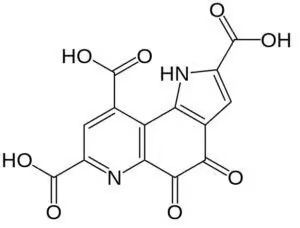Table of Contents
PQQ (pyrroloquinoline quinone or methoxatin) is a very potent antioxidant and plays a significant role in cognition and memory.
PQQ is the first nutrient discovered that promotes the growth of new mitochondria (mitochondriogenesis) in your cells. Brain cells have a higher concentration of these little cellular power plants than most other cells in your body.[i]
You can have anywhere from two to several thousand mitochondria in each brain cell. They even have their own DNA. When you increase the number of mitochondria, you have more cellular energy to power through your day.
PQQ was only discovered recently. But it’s been around for a very long time. So don’t roll your eyes when some New Ager claims that we’re made of stardust. PQQ was discovered aboard NASA’s spaceship “STARDUST” in interstellar dust particles.[ii]
PQQ plays a role in neurogenesis by helping to form the growth of new neurons through the stimulation of nerve growth factor (NGF).
PQQ protects against oxidative damage by shielding against cellular death and damage to DNA. It reduces inflammation in your brain. And it shields your brain from glutamate-induced toxicity preventing apoptosis (cell death).
PQQ is able to save and revive brain cells damaged from beta amyloid proteins associated with Alzheimer’s Disease. And prevents the formation of alpha-synuclein proteins that cause Parkinson’s Disease.
So give yourself an unfair advantage and add PQQ to your nootropic stack. Boost your brain power. And improve your energy, cognition, memory, and recall.
PQQ helps:
- Mitochondria. PQQ can increase the number of mitochondria in your brain cells. Mitochondria have their own DNA, and if you supply this super-nutrient, they start multiplying in each of your brain cells. It helps stop and reverse cell death. And increases cognitive function and efficiency.
- Neuroprotectant. PQQ helps clean up free radicals and oxidative stress damage in brain tissue. You proactively prevent mitochondria death and keep brain cells healthy.
- Nerve Growth Factor. PQQ stimulates production of nerve growth factor (NGF) which helps the growth of new neurons. And the branching of neurons. Improving memory and repairing damage caused by strokes.
Overview
PQQ (pyrroloquinoline quinone) was first recognized as an enzyme cofactor in bacteria by Norwegian biochemist Jens Hauge in 1964.[iii] It wasn’t until 2003 that Japanese brain researcher Tadafumi Kato found that PQQ also occurs in rodents and other mammals, including humans.

As an enzyme cofactor, PQQ is critical to the life of your brain cells. And some would say it’s even critical to life itself. “Cofactors” are molecules that act as a helper for enzymes that need assistance to work properly.
Recent studies verify the unique ability of PQQ to stimulate the creation of new mitochondria.[iv] And to improve the function of your existing mitochondria. But why would you want to hack your mitochondria?
It is an understatement to overstate the dramatic impact this has not only in your brain. But in your entire body. Mitochondria’s role is to convert the food we eat into energy that powers cells to perform at peak function.
This process of mitochondriogenesis stops and reverses brain cell death, and brain degeneration. PQQ is the only nutrient that can do this. And more energy in your brain cells means quicker thinking, better memory, amped-up alertness, less mental fatigue and more.
PQQ stimulates the growth of new neurons through the promotion of nerve growth factor (NGF) in brain cells. Resulting in improved memory, cognition and learning.[v]
PQQ is also a potent antioxidant mopping up free radicals that would otherwise damage brain cells.
PQQ is used in every cell in your body. And is particularly useful in brain cells. It’s about as close you can get to a vitamin without ‘officially’ being declared a vitamin.
You get PQQ from some of the food you eat including beans, celery, cocoa, fermented foods (i.e. tempeh, natto), kiwi, papaya, parsley, potatoes, spinach and wine. Babies get it from breast milk.
How does PQQ work in the brain?
PQQ boosts brain health in several ways. But two in particular stand out.
- PQQ promotes the growth of new mitochondria. This is the only known nutrient that can perform this function.
Mitochondria are the source of life and death for neurons. They generate your neuron’s energy and control its death. But mitochondria tend to develop defects as we age.
As these defects accumulate, mitochondria start to malfunction. This results in a reduction in cellular energy production. And cells die.
The result of this dysfunction can be brain fog, cognition problems, poor memory and recall. And ultimately neurodegenerative diseases like Alzheimer’s, Parkinson’s, Huntington’s, stroke and others.
Studies show that PQQ protects against this cellular damage by repairing and helping to create new mitochondria. Studies with mice and rats, and eliminating PQQ from their diet have shown reduced mitochondria.
To demonstrate how this process works, scientists added PQQ to mouse cells in the lab. And they showed that PQQ activated the cAMP response element-binding protein (CREB), and peroxisome proliferator-activated receptor-gamma coactivator-1alpha (PGC-1alpha). This pathway is known to regulate mitochondrial biogenesis.[vi]
- PQQ helps grow new neurons. This unique nutrient promotes the production of nerve growth factor (NGF). Assisting in brain cell repair, maintenance, and regeneration. Including many of the cells that are crucial for cognition, memory and learning.
NGF is especially important for maintaining neuroplasticity. This process is how brain cells form connections to communicate with each other. And is how we learn new stuff and then record it to memory.
By stimulating the production of NGF, PQQ has been found to protect memory and cognition in both animals and humans.
In one study, scientists demonstrated PQQ’s ability to promote the healing of injured nerves. The team used 90 healthy White Wistar rats, and divided them into 3 groups. The rats had injured (purposely) sciatic nerves. And were treated with Vitamin E, PQQ or combination of both.
The scientists found that 12 weeks after surgery and the introduction of PQQ to the wound, the nerves grew back! They concluded that the combination of Vitamin E with PQQ promoted nerve regeneration.[vii]
Another way that PQQ influences new neuron development is by protecting neuron stem and progenitor cells from glutamate toxicity (oxidative damage). This allows neurons to survive and potentially form new brain cells.[viii]
How things go bad
As we get older, the chemistry in our brain cells and energy metabolism changes.
↓ Neurons degenerate
↓ Recall, reaction time, memory, and mood diminish
↓ Neurotransmitter levels decline
All of these age-related changes are contributing factors to the neurodegenerative diseases of aging, including Alzheimer’s and dementia.
But even if things haven’t degenerated to such a debilitating level, PQQ can help.
PQQ benefits
Research from hundreds of studies have shown that PQQ will:
- Boost energy levels and stamina
- Reduce fatigue
- Improve sleep
- Reduce the possibility of age-related diseases
- Improve cognition, memory, learning and recall
- Repair damage caused by strokes
- Protects against Alzheimer’s and Parkinson’s
- Lowers LDL (bad) cholesterol[ix]
PQQ is an extremely powerful antioxidant. For example, PQQ is able to carry out 20,000 catalytic conversions, compared only 4 for Vitamin C.[x]
The studies in Parkinson’s Disease prevention and PQQ are particularly interesting. And applicable to neurohackers of any age.
We are exposed to pesticides in most of the fruit and vegetables we pick up at the supermarket. And who knows what kind of brain damage we subject ourselves to every day just from the food we eat.
In the lab, animals (rats and mice) have a pesticide injected directly into their brain to induce Parkinson’s-like symptoms. In one study, PQQ not only showed a protective effect against pesticide caused brain damage. It actually preserved brain mitochondria near control levels. [xi]
The message here is buy organic food, or supplement with PQQ. And you may be able to avoid getting Parkinson’s Disease later in life.
How does PQQ feel?
Mitochondria biogenesis means that your body is creating new mitochondria. PQQ increases the number of mitochondria in your brain cells. And throughout your body where energy demands are high.
Increasing your body’s mitochondria is one of the anti-aging ‘holy grails’. Boosting these tiny cellular energy power plants can prevent further damage. It can add overall energy to daily life. And maybe even slow down the aging process.
Neurohackers report dramatic improvements in mental and physical energy when adding PQQ to their nootropic stack. And I recommend adding CoQ10 for the synergistic effect.
PQQ has a cumulative effect and benefits should continue to improve over continued usage. For some the effects are immediate. For others it could take 2 or 3 months of dosing PQQ every day or every 2nd day.
PQQ is particularly effective if you’ve suffered mitochondrial damage from using statins.
Memory improves and you’ll be able to think things through more easily. Alertness gets a boost. And better vision and less eyestrain if you’re working on a computer, or staring at a screen all day.
Blood pressure readings could normalize. And you’ll feel refreshed and well-rested when waking up.
If you are dealing with Fibromyalgia you may get some benefit from PQQ with alleviating your chronic pain.
PQQ Clinical Research
PQQ Improves Mood
This study in Japan investigates the effectiveness of supplemental PQQ on stress, fatigue, quality of life and sleep. 17 adult male and female subjects took 20 mg of PQQ daily for 8 weeks.
Changes in stress, fatigue, quality of life measures and sleep were evaluated. The study showed that vigor, fatigue, tension-anxiety, depression, anger-hostility and confusion improved following administration of PQQ.
Measures for quality of life, appetite, sleep, obsession and pain also improved significantly. The volunteers also showed significant improvement in sleepiness at awakening, sleep onset and maintenance, and sleep duration.
The researchers concluded that supplementing with PQQ improved sleep quality and duration, mood improved due to less fatigue, and appetite, pain and obsession all showed improvement. And that PQQ is a “useful dietary supplement”.[xii]
PQQ Improves Cognition
PQQ is effective on its own in improving brain function. But when it is combined with CoQ10 the results are even more astounding. This synergy was first observed in animal studies. And was further demonstrated in a double-blind, placebo-controlled trial in Japan.
71 middle-aged and elderly volunteers age 40 – 70 were supplemented with 20 mg per day of PQQ. The result was an improvement on tests of higher cognitive function compared to placebo.
Then the research team gave the volunteers 20 mg of PQQ along with 300 mg of CoQ10. And the results in improved cognitive function were even more dramatic. PQQ and CoQ10 are both involved in mitochondrial function. So these results did not come as a big surprise.[xiii]
PQQ Boosts Memory
Many older adults experience problems with memory and other cognitive functions. And these issues seem to be happening to younger and younger people. As neurohackers, we always ask the question, “Are these declines inevitable?” And to that we say a profound, “No”!
In this Japanese double-blind, placebo-controlled trial 65 adults aged 50 – 70 years with forgetfulness were recruited. The volunteers were given 20 mg of PQQ and 100 mg of CoQ10 per day for 24 weeks.
The research team found that PQQ taken either alone, or in combination with CoQ10 has the potential to prevent, or even reverse, the decline in cognitive function caused by aging and oxidative stress.
The team concluded “PQQ was found to improve not only immediate memory, but also other higher brain functions such as spatial awareness. The effects of PQQ were enhanced when the substance was used with CoQ10.”[xiv]
PQQ Recommended Dosage
 You get PQQ from some of the food you eat including beans, celery, cocoa, fermented foods (i.e. tempeh, natto), kiwi, papaya, parsley, potatoes, spinach and wine. Babies get it from breast milk.
You get PQQ from some of the food you eat including beans, celery, cocoa, fermented foods (i.e. tempeh, natto), kiwi, papaya, parsley, potatoes, spinach and wine. Babies get it from breast milk.
Estimated daily intake of PQQ is 100 – 400 mcg. But it’s unlikely you’re getting enough PQQ from diet alone. And supplementation of this mitochondria generator could help.
Clinical studies with humans and animals tell us that 20 mg of PQQ daily is needed to experience cognitive benefit.
PQQ Side Effects
The primary “side effect” of using PQQ in your nootropic stack is – you’ll feel better. You should have more energy and thinking should be clearer and faster.
PQQ is non-toxic and supplementation is well-tolerated by most people.
Type of PQQ to buy
PQQ comes in tablet or capsule form 10 mg, 20 mg and 30 mg.
But you need to be aware of different forms of PQQ in the marketplace.
There is only 1 form available that is produced naturally. And that is BioPQQ® by Mitsubishi Gas Chemical Company of Japan. This company makes PQQ through bacterial fermentation. BioPQQ is licensed to several supplement makers.
You can get 10 mg BioPQQ® in the new Performance Lab® Energy formula that also contains Coenzyme Q10 100 mg (MicroActive® Q10), Acetyl-L-Carnitine (ALCAR) 750 mg, R-Lipoic Acid 150 mg (Bio-Enhanced® Na-RALA), and Piperine 2.5 mg (BioPerine®). A great way to boost your physical and mental energy without resorting to stimulants or caffeine.
Other forms of PQQ are produced through a chemical synthesis, involving the use of fairly toxic compounds, and have unresolved safety issues.
Nootropics Expert® Recommendation
PQQ 10 – 20 mg per day
 I recommend using PQQ as a nootropic supplement.
I recommend using PQQ as a nootropic supplement.
Your body does not make PQQ on its own. You can get some PQQ from the food you eat. But studies have shown we may not get an adequate supply of PQQ from food sources in our diet.
PQQ helps create mitochondria in your brain cells. When cellular energy gets a boost, you can experience better and faster thinking, learning is easier, recall is faster, and you’ll be more resistant to fatigue.
PQQ is especially helpful for those suffering from age-related cognitive decline. Studies show it helps stop or reverse brain degeneration with Alzheimer’s and Parkinson’s Disease. Especially in the early stages of the disease.
I suggest starting with a dose of 10 – 20 mg daily. And PQQ is a great compliment to a stack including any nootropic. It works particularly well when combined with CoQ10.
My favorite nootropic stack for boosting physical and mental energy is the new Performance Lab® Energy formula that uses the patented, natural BioPQQ® combined with Acetyl-L-Carnitine, R-Lipoic Acid, and BioPerine .
You need to provide your brain cells with fresh mitochondria and supply neurons with the fuel it is demanding. Or neurons start to break down from the inside. Signs that your lacking adequate PQQ is brain fog, slow thinking, headaches and muscle aches.
Age-related cognitive disorders that include muscle control problems may want to up the dose to 30 mg per day. But for a limited time until PQQ blood levels are stabilized. Work with your doctor.










Join The Discussion - 99 comments
Jacob taczynski
November 28, 2025
In reply to my previous comment, i am just curious if that feeling of lull and side effects go away after some time
David Tomen
November 29, 2025
See my comment below. It should go away. But why are you using PQQ at 22 years old?
Jacob taczynski
November 28, 2025
hey David, does pqq cause fatigue, as in an afternoon lull, before energy starts becoming consistent. I have this weird sour feeling i9n my throat and head, and on top of that, it feels like I’m slightly less motivated and like I have a lot of exhaust. I read this, “I’m having the same issue and this is what ChatGPT told me:
PQQ pushes mitochondria to work harder and make new ones. • That boost creates extra ROS (reactive oxygen species) — basically “exhaust” from the energy process. • Until your antioxidant systems (glutathione, NAC, etc.) catch up, you can feel tired and heavy. • This tiredness is usually temporary repair mode, not a crash. Bottom line: your fatigue right now is likely the normal byproduct of your cells remodeling and cleaning up.”
I feel this sort of explains what I’m feeling when I breathe? I’m not for sure, as I am 22 and in college trying to better my learning with racetams.
I’ve only been using pqq for a day.
David Tomen
November 29, 2025
Jacob, I’ve never heard of PQQ causing that reaction. But what Chat GPT says does make sense. Try supplementing with 500 mg NAC 3-times per day. And are using CDP-Choline with the racetams you are using?
Kora
May 20, 2024
Some manufacturers say it is best to consume PQQ first thing in the morning, on an empty stomach. Others say it should be consumed with a meal, because it is fat soluble. What is your take?
David Tomen
June 11, 2024
Kora, PQQ is water soluble so you can use it with a glass of water or a meal at any time of day. It’s up to you when and how you want to take PQQ.
Reza
February 2, 2023
Hi David,
Thanks for all the information about PQQ. Do you think Doctor’s Best PQQ is good quality? They mention it is the one coming from Japan. Also, I have severe insomnia, along with brain fog, and have heard a lot of good things about PQQ regarding sleep quality. I am hesitant to combine it with Coq10, since trying coq10 in the past seemed to worsen my insomnia, do you know how PQQ affect sleep?
David Tomen
February 3, 2023
Reza, Doctor’s Best BioPQQ is a good option because it is pure.
But PQQ and CoQ10 both help increase energy production in your mitochondria. That is why it causes insomnia. You need to use both of those supplements no later than noon.
But that may not ‘cure’ your brain fog and insomnia. See my article on brain fog here: https://nootropicsexpert.com/best-supplements-for-brain-fog/
And my article on sleep here: https://nootropicsexpert.com/best-nootropics-for-sleep/
Bruce Randall
January 1, 2023
What do you think of this product: Health Thru Nutrition PQQ 40mg Pyrroloquinoline Quinone as PureQQ
David Tomen
January 13, 2023
Bruce, Health Thru Nutrition puts out some good supplements. Take a look through the user reviews and see what others say about this form of PQQ.
Krista
October 11, 2022
What if you have already been diagnosed with beginning stage of Parkinson’s? I was going to start my Mom on 30 Pqq the BioPQQ, but wouldn’t ubiquinal be better than the CoQ 10? What else would you recommend in a nootropic stack? Resveratrol, quercitin, liposomal glutathione? I want to start my Mom on something’s as soon as possible, but they already have her on dopamine, blood pressure meds and I believe statins. How do I do this?
David Tomen
October 12, 2022
Krista, Ubiquinol is usually better for someone over 45 years. I haven’t written an article nor researched the best nootropic supplements for Parkinson’s. I do know that some with Parkinson’s prefer using natural L-DOPA over levodopa because it does not have the same side effects compared to the drug.
Best thing to do is search this site using the search function top right of the above menu. And do a search for “Parkinson’s” and then “Parkinsons” and see what turns up. You will get a list of supplements. Some will mention they are used to prevent Parkinson’s. And a few will show benefits with someone who has Parkinson’s.